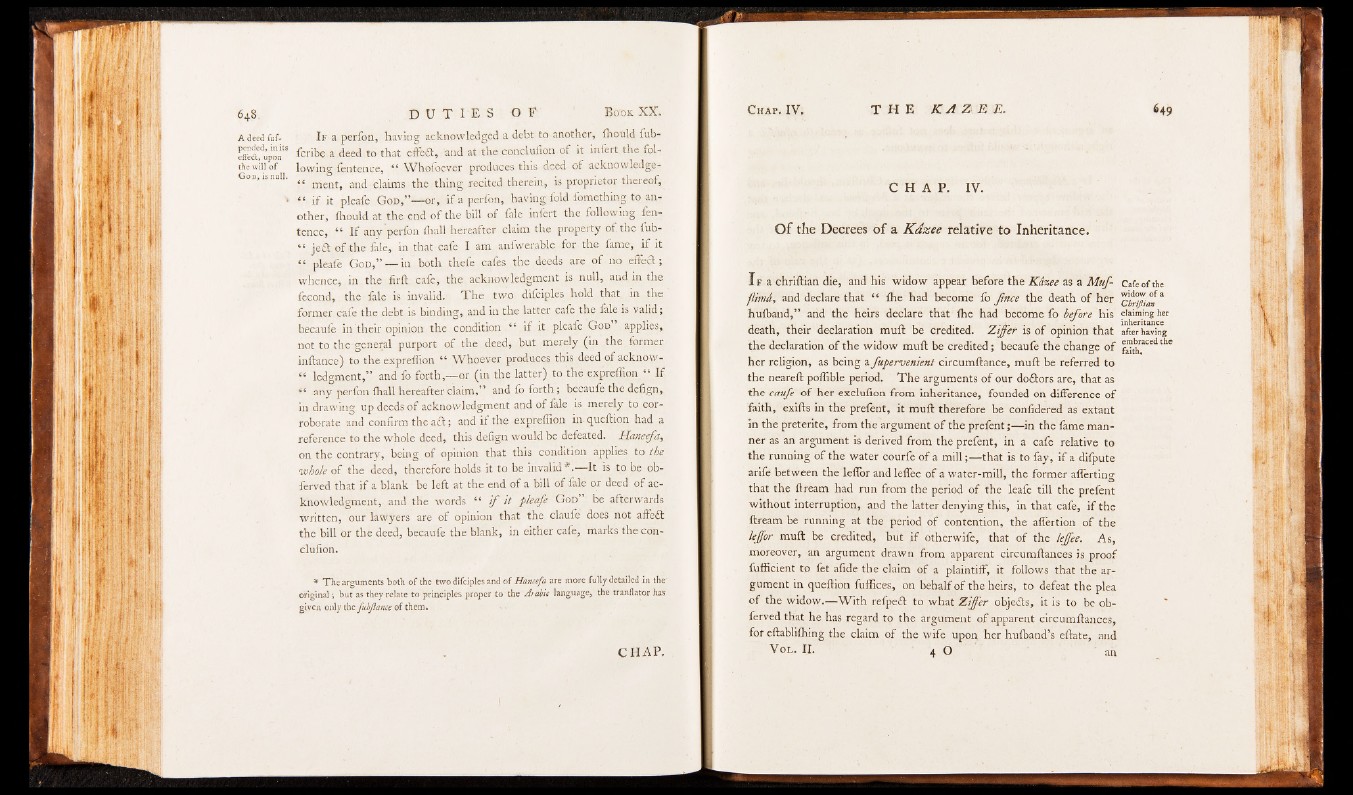
A d e e d f u f -
p e n d e d , i n i t s
e f f e c t , u p o n
t h e w i l l o f
G o d , i s n u l l .
If a perfon, having acknowledged a debt to another, fhould fub-
fcribe a deed to that effedt, and at the conclufion of it infer.t the following
fentence, “ Whofoever produces this deed of acknowledge-
“ ment, and claims the-thing recited therein, is proprietor thereof,
“ if it pleafe G o d , ” —-or, if a perfon, having fold fomething to another,
fhould at the end of the bill of fale infert the following fen-
tence, “ If any perfon lhall hereafter claim the property of. the fub-
“ jedt of-the fale, in that cafe I am anfwerable for the fame, if it
“ pleafe G o d , ” — in both thefe cafes, the .deeds are of no effedt;
whence, in the firft cafe, the acknowledgment is. null, and in the
fecond, the fale is invalid. T h e two difciples hold that in the
former cafe the debt is binding, and in the latter cale the fale is valid;
becaufe in their opinion the condition “ ,if it pleafe G o d applies,
not to the-general purport of the deed, but merely (in the former
inftance) to the exprellion “ Whoever produces this deed of acknow-
“ ledgment,” and fo forth,g-or (in the latter) to thé exprellion “ If
any perfon lhall hereafter claim,” and fo forth; becaufe the defign,
in drawing up deeds of acknowledgment and of lale is merely to corroborate
and confirm the adt; and if the exprellion in. queftion had a
reference to the whole deed, this defign would be defeated. Haneefa,
on the contrary, being of opinion that this condition applies to the
whole of the deed, therefore holds it to be invalid*.— It is to be.ob-
ferved that if. a blank be left at the end of a bill of fale or deed of acknowledgment,
and the words “ i f it pleafe G o d be afterwards
written, our lawyers are of opinion that the, claufe does not affect
the bill or the deed, becaufe the blank, in either cafe, marks the con-
clulidn.
* T h e arguments both o f the two difciples and o f Haneefa are more fully detailed in the'
original; but as they relate to principles proper to the Arabic language, the tranflator has
given only the fubjlance o f them.
CHA P .
C H A P . IV.
O f the Decrees o f a Kdzee relative to Inheritance.
I f a chriftian die, and his widow appear before the Kdzee as a Muf- Cafeofth e
jlima, and declare that “ the had become fo Jince the death of her 'c^rfial *
hutband,” arid the heirs declare that the had become fo before his claiming her
death, their declaration mull: be credited. Zijfer is of opinion that after having
the declaration of the widow mull be credited; becaufe the change o f f“t'j1race<1 thc
her religion, as being a fupervenient circumftance, muft be referred to
the neareft poffible period. The arguments of our dodtors are, that as
the caufe of her exclufion from inheritance, founded on difference of
faith, exifts in the pretent, it muft therefore be confidered as extant
in the preterite, from the argument of the prefent;— in the fame manner
as an argument is derived from the prefent, in a cafe relative to
the running of the water courfe of a mill;— that is to fay, if a difpute
arife between the leflor and leffee of a water-mill, the former affertino-
that the flream had run from the period of the leafe till the prefent
without interruption, and the latter denying this, in that cafe, if the
ftream be running at the period of contention, the aflertion of the
leffor muft be credited, but if otherwife, that of the leffee. As,
moreover, an argument drawn from apparent circumftances is proof
fufficient to fet afide the claim of a plaintiff, it follows that the argument
in queftion fuffices, on behalf of the heirs, to defeat the plea
of the widow.— With refpedt to what Zijfer objects, it is 'to be ob-
ferved that he has regard to the argument of apparent circumftances,
for eftablilhing the claim of the wife upon her hulband’s eftate, and
V ol. II. 4 O an